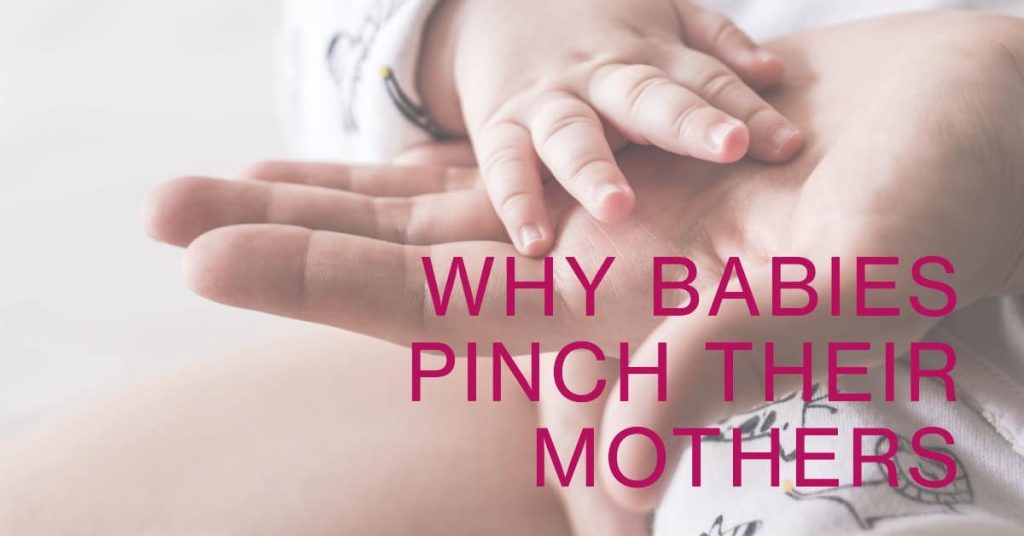Are you concerned that why does my baby Pinch Me When Falling Asleep? It may be uncomfortable but it’s usually nothing to worry about as long as your baby isn’t hurting you too much.
Babies can pinch their parents during sleep due to several reasons. the most potential reasons are tiredness, lack of communication skills, seeking sensory, frustration, teething and Anxiety.
In this guide, we will talk about the top five reasons of baby pinch their parents while falling asleep. Also, we will talk about how to avoid this type of baby-pinching situation. So, let’s start right now!
The Reasons for a Baby Pinching While Sleeping

Babies have a myriad of ways to express themselves, and sometimes, pinching may be one of them. This behavior can be attributed to various factors that are common among infants.
Tiredness:
One of the primary reasons for a baby’s pinching behavior while sleeping is fatigue. Babies, much like adults, may fidget or engage in self-soothing behaviors when they are overtired. Pinching provides a sensory experience that can be calming for some infants, helping them ease into slumber.
Lack of Communication Skills:
Babies are not yet equipped with the ability to articulate their needs and feelings through language. Pinching may serve as a form of non-verbal communication, allowing them to convey discomfort, restlessness, or a desire for attention. This can be especially pronounced during sleep, as they may not have other means to express themselves.
Seeking Sensory Stimulation:
Babies are highly sensory-driven beings, and they often explore the world around them through touch. Pinching can offer tactile stimulation, which helps infants process and understand their environment. This sensory input can provide a sense of security and familiarity, aiding them in falling asleep.
Frustration:
Infants can become frustrated when they encounter difficulties in settling down to sleep. Pinching may be a manifestation of this frustration, as they attempt to find a way to self-soothe and alleviate their discomfort. It’s important for parents to be attuned to their baby’s cues and address any potential sources of frustration.
Teething:
Teething is a significant developmental milestone that can bring discomfort and pain to babies. During this period, infants may instinctively seek relief by applying pressure to their gums. Pinching can be a way for them to manage the discomfort, even while they are asleep.
Anxiety:
Just like adults, babies can experience anxiety. This may stem from unfamiliar environments, changes in routine, or even separation from their caregivers. Pinching can be a self-comforting mechanism that helps them cope with these feelings of anxiety, allowing them to find solace in their own touch.
How to Stop Comfort Pinching?
Comfort pinching is a common behavior exhibited by babies seeking sensory stimulation. It is a normal phase in infant development. However, there are strategies parents and caregivers can employ to gently discourage and redirect this behavior. In this article, we will explore effective methods to help stop comfort pinching.
Provide Alternative Sensory Stimulation:
Offer soft, textured toys or blankets that provide tactile comfort. This can redirect the baby’s need for sensory input away from pinching. Engage in gentle massages or cuddles to fulfil their sensory needs in a more soothing manner.
Maintain a Consistent Routine:
Establishing a regular sleep and feeding schedule can help reduce anxiety and frustration, which may be contributing to the pinching behavior.
Teething Relief:
If pinching is related to teething discomfort, provide safe teething toys. Also, you can give chilled teething rings for the baby to chew on. This can offer relief and reduce the urge to pinch.
Create a Calm Sleep Environment:
Ensure the baby’s sleep space is conducive to rest. Use soft bedding, maintain a comfortable room temperature, and minimize any potential sources of discomfort.
Observe and Respond to Cues:
Pay close attention to the baby’s body language and facial expressions. Respond promptly to signs of discomfort, restlessness, or anxiety. At the same time, it offers comfort before the pinching behavior escalates.
Encourage Self-Soothing Techniques:
Introduce gentle self-soothing techniques like offering a pacifier or allowing the baby to hold a soft, comforting object during sleep.
Limit Exposure to Stressors:
Minimize exposure to situations or environments that may induce anxiety or discomfort. This can help reduce the likelihood of pinching as a coping mechanism.
Practice Positive Reinforcement:
When the baby refrains from pinching, offer verbal praise and gentle affirmations. Positive reinforcement can help encourage more adaptive self-soothing behaviors.
Consult a pediatrician:
If comfort pinching persists or seems to be related to an underlying issue, seek advice from a paediatrician. They can offer specialized guidance based on the baby’s individual needs.
Be Patient and Understanding:
Remember that comfort pinching is a phase that many babies go through. Approach the situation with patience, empathy, and a willingness to adapt strategies as needed.
What Does It Mean When a Baby Pinches You?
It usually means they are exploring their environment and trying to understand how the world works. It is important to remember that babies do not understand the concept of pain or what could potentially hurt someone else.
Pinching can be a form of communication for them, as they may be trying to get your attention or express excitement or frustration.
They also might just be curious about objects and sensations, wanting to explore with their hands – which includes pinching! It is important when this happens to stay calm so that your baby does not think it’s okay to pinch others as well.
Instead, gently remove their hand from whatever it was pinching and offer alternatives such as toys or other objects (or even body parts!) for them to explore in more appropriate ways.
Why Does My Baby Pinch Me While Breastfeeding?
Why is my baby pinching me during breastfeeding? Babies pinch while breastfeeding for exploration. Their tiny hands discover their surroundings, sometimes pinching. It’s a sensory experience, feeling mom’s skin or clothes. Teething discomfort is a reason too, for seeking relief through pinching. Communication is key, as babies connect with their caregivers. Pinching is part of normal development.
It might also signal hunger or impatience. Redirecting gently helps. Providing different sensations or teething tools can be effective. Time and care will see this phase pass. Seek advice from a paediatrician or lactation consultant if needed. They offer valuable support for both baby and parent.
Why Does My Baby Thrash Around When Falling Asleep?
It’s perfectly normal for babies to thrash around when falling asleep, and it is actually a sign that they are transitioning from an active state to a passive one. This behavior is sometimes called “active sleep,”
And it can range from simple twitching or flailing of the arms and legs to more vigorous movements such as rolling over or kicking. It may seem strange, but this type of activity helps your baby transition into a deep sleep stage.
Active sleep gives way to quiet restful sleeping which is essential for proper development in infants. Additionally, thrashing around before bedtime can help relieve tension accumulated during the day; it’s like giving your baby a mini-massage!
If you notice that your baby seems uncomfortable while flailing around at night, try swaddling them tightly with a blanket so that their limbs don’t move too much as they drift off into slumberland!
Conclusion
This blog post has highlighted the many reasons why babies may pinch their parents when falling asleep. While it is not always easy to determine the particular cause of a baby’s behavior, understanding what is normal development and being aware of possible solutions can help reduce episodes of pinching. As long as parents are patient and consistent in addressing this issue, they should be able to find an effective solution that allows everyone involved to get some quality sleep.




